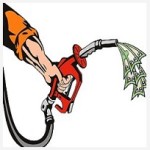 Gasoline has dropped about $1.50 a gallon
Gasoline has dropped about $1.50 a gallon
According to AAA the national average price of gas is $2.17 (1/9/15) per gallon, for regular. Gas Buddy reports that the highest average price in 2014 was about 3.70 in April. This $1.53 per gallon drop can mean a few extra thousand dollars in your pocket this year. These opportunities don’t come along often, so take advantage of these times to increase your financial strength. Consider how much money that might free up in your budget:
| Miles Per Gallon | Average Miles Driven | Annual cost of gasoline @ $4 per gallon | Annual cost of gasoline @ $2 per gallon | Yearly Savings | Savings with 2 cars |
| 15 | 15,000 | $3,700 | $2,170 | $1,530 | $3,060 |
| 20 | 15,000 | $2,775 | $1,628 | $1,148 | $2,295 |
| 25 | 15,000 | $2,220 | $1,302 | $918 | $1,836 |
| 30 | 15,000 | $1,850 | $1,085 | $765 | $1,530 |
| 40 | 15,000 | $1,388 | $814 | $574 | $1,148 |
What NOT to do With Extra Gas Money
- Don’t increase your lifestyle. Most people will do this as they notice extra money left in their checking account. It’s easy to rationalize when you’ve gone without, so you might be tempted to purchase extras.
- Don’t borrow money. Maybe your driving an older car, or your furniture is wearing out. Don’t borrow to buy something that you can barely afford. Remember, gasoline prices could easily rocket back up if there is an international or national crisis. Plus, you could be faced with an unexpected expense such as a large medical bill. Saving the extra money could help you avoid borrowing for an unexpected bill.
- Don’t buy stupid stuff. Many people spend their tax return on an even bigger TV or take a trip to Disneyland spending thousands. Walk on past the big screen TV’s at the entrance of Costco, thumb your nose at expensive money and time wasters. Remember “More = Less” and “Less = More” when it comes to ‘stuff’. The more stuff you own, the more cluttered life becomes, and the more things you will need to maintain and fuel. For a funny video about ‘stuff,’ check out George Carlin’s piece on this subject.
- Don’t buy a ‘gas hog,’ You may be tempted to buy a car that gets bad gas mileage or an unneeded big truck or SUV now that gas prices are lower. Don’t do it. Remember, financially wise people use these opportunities to ‘get ahead’, not to get ‘a big head’ by purchasing a status symbol or bigger fun toy.
You just got a raise, thanks to the price of gasoline. Think of this opportunity as an increase in your income. Use this simple chart to estimate the raise you are getting.
| Miles Per Gallon | Average Miles Driven | Yearly Savings | Your Gross Income before deductions | Net ‘Take Home’ income after deductions at @ 25% | New income with gas savings | Approx. Increase in Income |
| 15 | 15,000 | $1,530 | $50,000 | $37,500 | $39,030 | 4.08% |
| 20 | 15,000 | $1,148 | $50,000 | $37,500 | $38,648 | 3.06% |
| 25 | 15,000 | $918 | $50,000 | $37,500 | $38,418 | 2.45% |
| 30 | 15,000 | $765 | $50,000 | $37,500 | $38,265 | 2.04% |
| 40 | 15,000 | $574 | $50,000 | $37,500 | $38,074 | 1.53% |
Smart Things to Do with Your Extra Gas Money
- Do increase savings for emergencies, if you don’t have an emergency fund. Bankrate says that only 38% of people have one. This is a wonderful opportunity to plan for life’s unexpected expenses, or for car replacement later on.
- Do increase contributions into your retirement account, such as if your employer offers a 401(k), 403(b), 457 or other type of defined contribution retirement plan.
- Do obtain a financial plan such as eFinPLAN, so that you know how much to invest or what insurance policies you may need to consider.
- Do consider life and disability insurance. I’m amazed that many people have little to no life or disability insurance. People with children and households which depend upon a bread winner’s income desperately need adequate protection. Don’t put this off.
- Do increase charitable donations. This will help you avoid narcissistic self-involvement. Helping others is good for your community and your attitude. Perhaps you have noticed that generous people succeed more, a study from from Wharton indicates this is true!
- Do have fun, buy a nice dinner, enjoy time with friends, but spend within your ‘pre-gasoline decrease’ budget.
In summary, this is a great mini-opportunity to take advantage of a financial edge. The title of this article asks “What’s Your Plan?”. If you don’t have a plan, you’ll just spend any extra savings and miss this great opportunity to get ahead.









